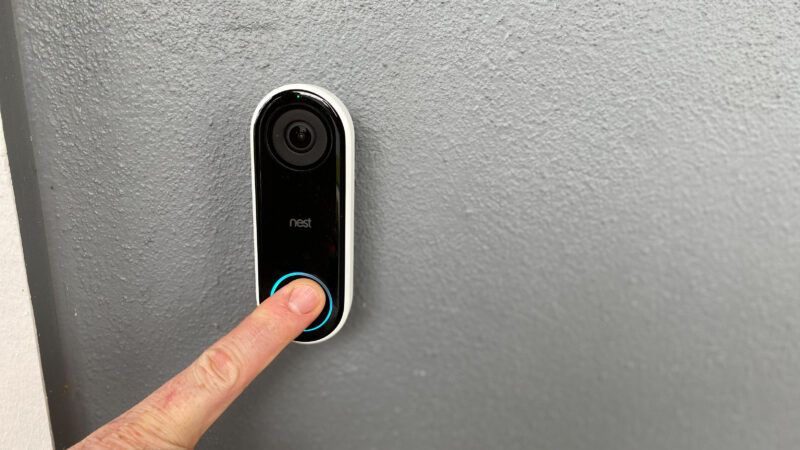Amazon's Ring Will Stop Giving Police Your Doorbell Footage Without a Warrant
While not perfect, the move is a step in the right direction for civil liberties.

In a victory for privacy rights, the country's leading video doorbell company announced this week that it would no longer give law enforcement agencies direct access to customers' footage.
Ring, which is owned by Amazon, offers a companion app called Neighbors, which lets users upload and share footage captured by their Ring video doorbells and surveillance cameras. The company touts that Neighbors improves safety and fosters a sense of community.
Ring debuted the Request for Assistance tool in 2021, a Neighbors feature through which law enforcement agencies could "request information or video" from users. Ring noted at the time that "you always have total control over your experience. Request for Assistance posts are opt-in, nothing is shared with any agency unless you actively go through the steps of choosing to do so." Requests would also be publicly accessible.
Eric Kuhn, who runs Neighbors, wrote on the site's blog this week that Ring would be "sunsetting the Request for Assistance (RFA) tool." Kuhn noted that "public safety agencies like fire and police departments can still use the Neighbors app to share helpful safety tips, updates, and community events," but "they will no longer be able to use the RFA tool to request and receive video in the app."
Kuhn didn't specify why Ring was choosing to shutter the RFA tool, but it was a potential civil liberties nightmare. As Reason noted in July 2022, police departments could access users' Ring footage without a warrant. While Ring insisted that users had control over who had access to their footage, the Law Enforcement Request page on Amazon's website included a bright red "Submit Emergency Request" button, and Amazon's Law Enforcement Guidelines noted that the company "reserves the right to respond immediately to urgent law enforcement requests for information in cases involving a threat to public safety or risk of harm to any person."
In response to a letter from Sen. Ed Markey (D–Mass.), Amazon admitted in July 2022 that "so far this year, Ring has provided videos to law enforcement in response to an emergency request only 11 times." While Amazon was apparently proud of its restraint, that it had only granted 11 requests in six months, Jason Kelley and Matthew Guariglia of the Electronic Frontier Foundation noted that "there is no process for a judge or the device owner to determine whether there actually was an emergency. This could easily lead to police abuse: there will always be temptation for police to use it for increasingly less urgent situations."
This was especially concerning given how closely the company aligned itself with law enforcement: In major cities like Akron, Ohio, and El Monte, California, Ring donated doorbell cameras for police departments to give out for free. Lehigh County, Pennsylvania, started a cloud-based doorbell camera registry in which citizens could make their recordings easily available to police.
Notably, the RFA program being discontinued is separate from Amazon's Law Enforcement Request tool; as Ring's parent company, Amazon may still be able to exert authority over Ring's disclosure decisions. But it still signals a step in the right direction that police departments will increasingly need to rely on warrants if they want access to your private footage.
Cmdr. Joe Garrett with Illinois's Merrionette Park Police Department told CBS 2 that he was "a little disappointed" with the change, but added, "We'll learn to adjust to it. If we have to get search warrants, we'll have to learn to be a little quicker about it."


Show Comments (30)